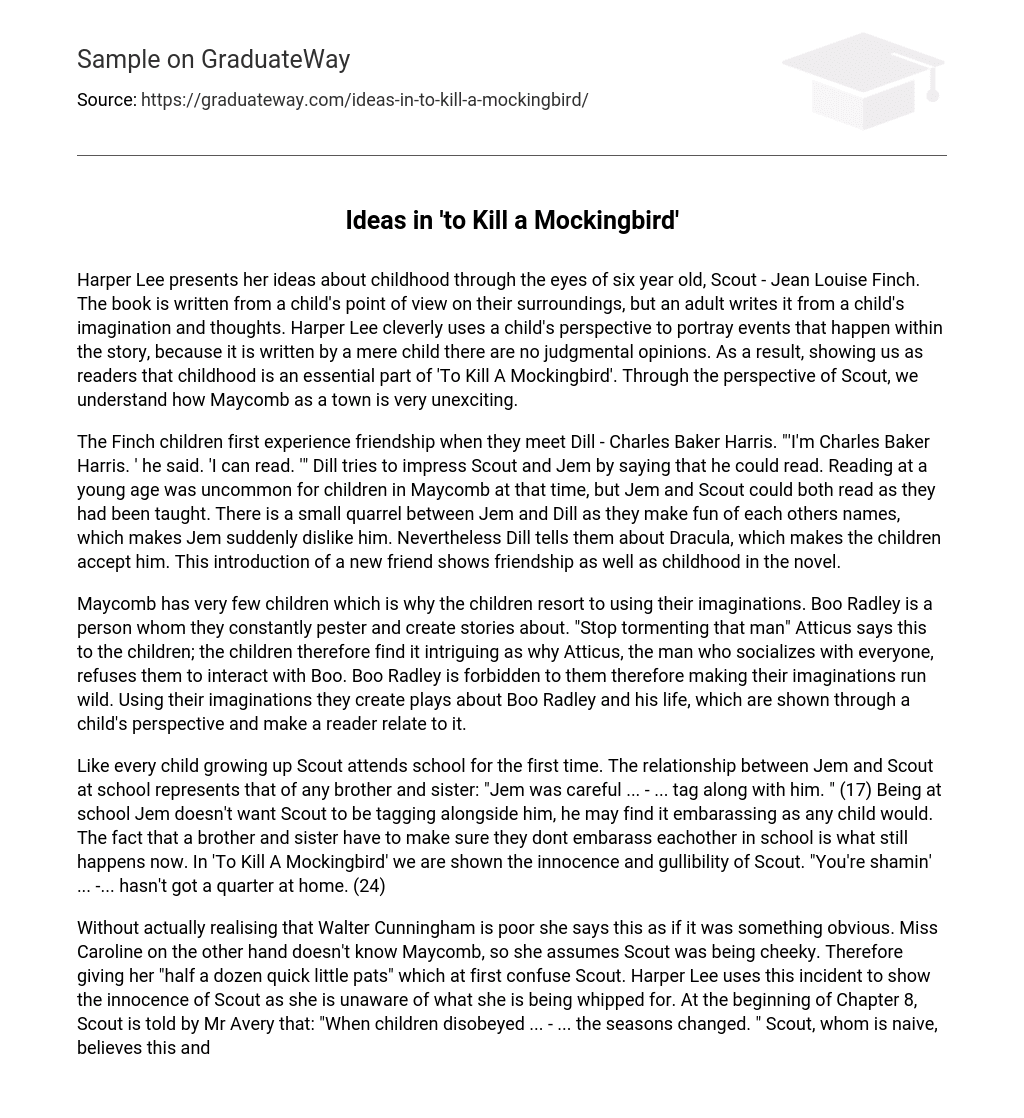Harper Lee explores the concept of childhood through the perspective of six-year-old Scout – Jean Louise Finch. In “To Kill A Mockingbird,” the book is narrated from a child’s viewpoint, capturing their observations and imagination. By employing the voice of a child, Lee effectively portrays the events of the story without any biased opinions. Consequently, she highlights the significance of childhood in the novel. Through Scout’s eyes, the reader gains insight into the mundane nature of Maycomb, the town in which the story unfolds.
The Finch children’s first experience of friendship occurs when they meet Dill, or Charles Baker Harris. Dill boasts to Scout and Jem that he can read. In Maycomb at that time, it was unusual for children to be able to read at such a young age, but both Jem and Scout were able to read because they had been taught. Jem and Dill have a minor argument over their names, which causes Jem to suddenly dislike Dill. However, Dill wins the children over by telling them about Dracula. This introduction of a new friend not only showcases friendship but also captures the essence of childhood in the novel.
Maycomb has a limited number of children, leading them to rely on their imaginations. They continuously bother and invent tales about Boo Radley, a person. Atticus warns the children to stop tormenting Boo Radley, which piques their curiosity as to why Atticus, a sociable person, prohibits them from interacting with Boo. Since Boo Radley is off-limits to them, their imaginations run wild. By utilizing their imaginations, they craft plays depicting Boo Radley’s life from a child’s point of view, creating a relatable experience for readers.
Scout, like any child, goes to school for the first time. The dynamic between Jem and Scout at school reflects that of typical siblings. Jem is cautious about Scout following him, as stated in the passage: “Jem was careful … – … tag along with him.” (17) It is natural for a child to feel embarrassed by their younger sibling accompanying them at school. This scenario, where siblings try not to embarrass each other in school, still occurs today. In ‘To Kill A Mockingbird,’ the novel highlights Scout’s innocence and naivety. As seen in the quote: “You’re shamin’ … – … hasn’t got a quarter at home.” (24)
The text highlights the incident involving Scout and Walter Cunningham. Initially, Scout unknowingly references Walter’s poverty, which Miss Caroline misinterprets as cheekiness. Consequently, Miss Caroline gives Scout a series of quick pats, confusing her. Harper Lee uses this incident to demonstrate Scout’s innocence as she is unaware of why she is being punished. In Chapter 8, Mr Avery tells Scout that when children disobey, the seasons change. Naively, Scout believes this and later concludes that the world is ending when it starts snowing.
Harper Lee uses this to demonstrate that children have a tendency to unquestioningly trust what adults say, assuming their opinions are reliable and impartial. They also consider Boo Radley to be a threat due to the influence of adult gossip and fabricated tales. However, towards the end of the novel, Boo rescues them, causing Jem and Scout to realize that he is not dangerous at all. This suggests that the children were initially captivated by the rumors circulating in Maycomb, leading them to view Boo Radley as a monstrous figure who devours cats. Through the character of Boo, Harper Lee highlights the inherent naivety and credulity of children, causing them to believe anything they are told.
The text emphasizes Harper Lee’s intention to remind the reader that Scout has grown from a child into an adult. In Chapter 11, Lee conveys this by stating, “When we were small…” This emphasizes Lee’s desire for the reader to perceive Scout’s childhood. However, during a conversation involving one of the children, the language shifts to informal slang and phonetically spelled words. For example, “You gonna give me a chance to tell you? I don’t mean to sass you, I’m just trying to tell you.” This highlights the reprimanding of Scout by Uncle Jack.





